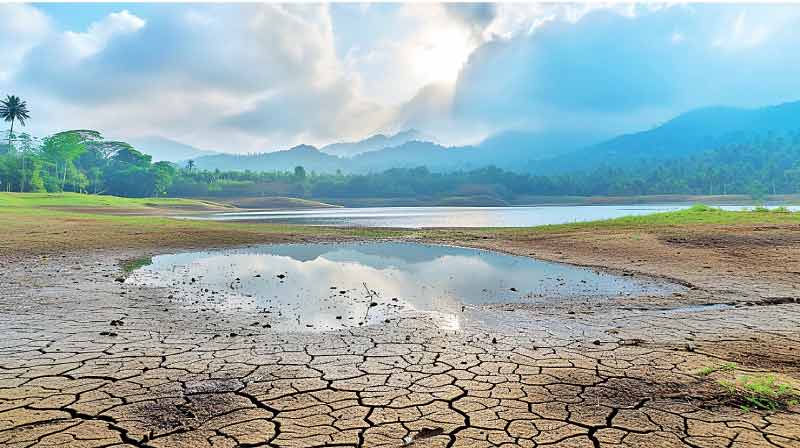Wednesday Feb 18, 2026
Wednesday Feb 18, 2026
Monday, 6 May 2024 00:00 - - {{hitsCtrl.values.hits}}

Meso-level actors (such as trade or industry associations) can play a unique role for managing climate risks and building a more resilient business ecosystem
 Climate risks contribute to an increasingly complex landscape of risks that affects all levels of societies and economies. Especially in developing countries such as Sri Lanka, direct climate change impacts as well as long-term, indirect, or non-economic consequences of climate change have the potential to severely disrupt key sectors such as agriculture or fisheries. In managing these risks and building long-term resilience, the focus often lies on micro-level actors, including entrepreneurs, small businesses, and farming households, and government actors on the macro level, who create the overall enabling environment and manage public budgets.
Climate risks contribute to an increasingly complex landscape of risks that affects all levels of societies and economies. Especially in developing countries such as Sri Lanka, direct climate change impacts as well as long-term, indirect, or non-economic consequences of climate change have the potential to severely disrupt key sectors such as agriculture or fisheries. In managing these risks and building long-term resilience, the focus often lies on micro-level actors, including entrepreneurs, small businesses, and farming households, and government actors on the macro level, who create the overall enabling environment and manage public budgets.
However, there is a variety of intermediary actors that sit between these levels, such as industry or trade associations, producer groups, chambers of commerce, credit unions, civil society organisations, or banks. These meso-level actors can act as risk aggregators and perform important functions to build the resilience of the business ecosystem, facilitate synergies, and strengthen sustainable and green business practices among entrepreneurs and other micro-level actors.
Collective and systemic risk management
Meso-level actors are in a unique position to not only address individual risks but take a wider view and address risks in more systemic manner. For example, they can help to manage covariate risks, which affect multiple micro-level entities at the same time, for example in the case of extreme weather events; compound risks that reinforce each other and can develop negative synergies; or cascading risks, which can ripple along supply or value chains and affect actors in different areas or sectors through a chain reaction of failures or disruptions.
Associations and other intermediate actors can serve as risk aggregators and share or pool risks to reduce the individual impacts and make severe consequences (such as bankruptcy, falling into poverty, or loss of business) less likely. In addition to directly managing such risks, meso-level actors can also contribute to the resilience-building of their constituents or ecosystem by providing a range of services, including the following:
Services related to data and knowledge management: Meso-level actors can collect and disseminate critical information to their constituents and act as databases, knowledge hubs, or platforms for organised exchange. Based on the available data, they can perform industry or area risk assessments that map out vulnerabilities within specific supply chains or ecosystems and identify needs and priorities of ground-level actors.
Provision of direct support: In addition to their knowledge management and exchange function, meso-level actors can also leverage existing resources to facilitate capacity-building, or technical support provision to smaller entities that might otherwise not be able to afford or access such services. This can include formal advisory groups or expert committees, peer learning, or frameworks for mutual support. Furthermore, they can also assist micro-level actors to establish business continuity or contingency plans, invest in technology or equipment, scale up innovation, and provide services such as quality assurance, optimisation, testing, or monitoring to strengthen the efficiency and resilience of businesses.
Collective mechanisms and actions: Finally, meso-level actors can work to de-risk investment, spread financial risks, integrate value chains, and elevate the resilience of their entire sector or area. By pooling resources, they can set industry standards, issue certifications, engage in collective bargaining, and contribute to policy processes by providing important inputs and perspectives from their constituents.
Challenges and opportunities
Despite this potential to contribute to risk management and resilience-building, meso-level actors also face significant challenges. This includes limited financial resources of their own, often combined with difficulties in pooling resources from their constituents; lack of access to relevant technologies and expertise; transaction costs and limited human and institutional capacities; and low awareness of climate risk and risk management. Furthermore, the focus of many projects and initiatives often lies on micro- or macro-level actors, focusing on individual entrepreneurs and households or on the enabling policy environment.
To leverage the full potential of meso-level actors, it is important to recognise, understand, and support the role of these actors. Financial incentives, such as grants and subsidies, technical support in the form of training and access to technology, and inclusion in plans and policies can empower these organisations to fulfil their roles effectively and close resilience gaps across a wider area, stakeholder group, or economic sub-sector. In addition, multi-actor partnerships can enhance strategic alignment between different meso-level actors (for example, trade associations within the same sector) and between different levels (for example, local trade associations, chambers of commerce, and relevant government departments), leading to greater coherence and co-benefits as well as a more efficient use of resources.
In conclusion, while micro- and macro-level actors play a crucial role for climate action and resilience-building and need adequate support, it is important to not overlook the meso-level and its ability to aggregate risks; manage specific risk categories and cases; enhance data and knowledge management; provide direct support; and facilitate collective action that catalyses synergies and empowers communities and ground-level stakeholders. Strengthening the work of these organisations towards sustainability and resilience can help to ensure a more resilient future for the whole of society and the economy.
(The writer works as Director: Research and Knowledge Management at SLYCAN Trust, a non-profit think tank based in Sri Lanka. His work focuses on climate change, adaptation, resilience, ecosystem conservation, just transition, human mobility, and a range of related issues. He holds a Master’s degree in Education from the University of Cologne, Germany and is a regular contributor to several international and local media outlets.)